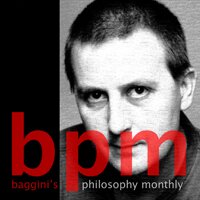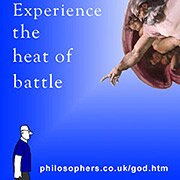 This edition includes a report from the 2010 Philosophers’ Football Match, where tpm editor Julian Baggini talks to AC Grayling, Laurie Taylor, comedian Mark Steel, former England manager Graham Taylor, and many more. Find out what the tribute to the famous Monty Python sketch was really about. Plus, there’s an interview with historian and philosopher of science Jay Kennedy, whose claim to have cracked “The Plato Code” is provoking an international scholarly debate.
This edition includes a report from the 2010 Philosophers’ Football Match, where tpm editor Julian Baggini talks to AC Grayling, Laurie Taylor, comedian Mark Steel, former England manager Graham Taylor, and many more. Find out what the tribute to the famous Monty Python sketch was really about. Plus, there’s an interview with historian and philosopher of science Jay Kennedy, whose claim to have cracked “The Plato Code” is provoking an international scholarly debate.
Podcasts
July podcast
Discussion
3 comments for “July podcast”
Post a comment
Sections
Subscribe to TPM

 Email This Post
Email This Post 


About the first part of the pod cast, the subject of introducing, at school, “philosophy” to children. TPM ran a series of three (I think) articles on the subject a couple of months ago. Perhaps that series has left an impression on me as to the worthiness of such a course of action. If so, unfortunately is wasn’t a positive one. I say “unfortunately” because exposing children to a way of thinking which can be critically important to them and at the same time one they might not otherwise have a chance to learn is quite laudable. What I felt from the articles was a strong over-idealistic pitch for the program, similar to a number of other high touted pitches from the educational field that end up doing far less than advertised. There was some of that naïve sounding idealism present in the pod cast.
I also can’t help feeling there’s a certain amount of dishonesty in claiming what will be taught is “philosophy.” If I teach a child to count on their fingers from 1 to 3 could I really say I’m teaching the child higher mathematics? Julian, you used the word “populist” in the second part of the pod cast, which I’ll get to in a bit, and I believe you used it with suspicion that the true impetus of philosophy is being bastardized. Aren’t you concerned that this attempt at teaching a watered down version of critical thinking as philosophy might ultimately debase the stature of the subject?
I read the article that appeared in the Guardian(?) last week on the decoding of Plato with a great deal of interest. One of your first questions posed to Dr. Kennedy was one that I had also: what gave him the idea of looking for the code in the first place? Disappointing answer.
I really do find a lot of what Dr. Kennedy said strange. For example, taking a certain ratio of a line repeatedly without giving the exact ratio and considering this curious. That’s what mathematicians do. I assume Plato wasn’t being specific because he had something in general in mind. But also to look at 61.7% (?), the golden mean ratio, into the text of the Republic to find the passage about the ratio business, so what? Why would Plato be playing games to hide something about the golden ratio? Was that considered criminal thinking? Was it really a dangerous idea to say the cosmos had a mathematical base? In light of things freely written about like the atomist theory, I’d say not.
Why use music as a bridge, as Dr. Kennedy suggests, to getting to the good stuff? Also, his argument about the first —teen centuries after his death scholars working long and hard dealing with the symbolism he used, why would he need to write in code if he already did such a worthy job symbolically? Or is Dr. K suggesting they’re the same thing?
Finally, Socrates could have avoided the execution but chose not to. It sounds like he had his own agenda and being executed became part of it.
I’m surprised by Mr Sabella’s reasoning concerning philosophy in schools. If I teach a child to count to 3 on its fingers, I am either teaching it Mathematics, or - if you want to quibble - the foundation it needs to learn Mathematics. Yes, it would indeed be ridiculous to suggest that this was ‘higher’ maths, but then no-one is suggesting that children are to be taught ‘higher’ philosophy either. And surely we have to start with the basic concepts of philosophy before moving to a higher level. Mr Sabella is right to caution against the danger of passing off watered-down ‘philosophy’ as the real thing. However, to say that something might be done badly is no argument for it not to be done at all. As someone who runs philosophy sessions with primary school children I can assure any doubters that 9-10 year old children grapple with metaphysics just as well as most of us on my first undergraduate year did. And that was 22 years ago…
Andrew, (hope you don’t mind the informality)
As I said in my original comment, my views were influenced by the earlier essays that ran in TPM, and I think you’ll agree it fruitless to revisit them at this point. Also, if you look at that comment you’ll see I’m very much in favor of teaching children critical thinking, and if I had an option getting my grandchildren into such programs I’d gladly opt for it.
“Philosophy” itself has always seemed daunting enough without necessity of using a greater comparative with it.
I’ll try to address my concern as succinctly as I’m able. Philosophers appear to have suddenly awakened to the fact their subject is not popular and frantically mean to correct this, my fear is, by selling it as something that it isn’t and, if necessary, tailoring it to fit the need. That’s why I’m a bit finicky about using the word philosophy inappropriately.
It truly pleases me you’re having what sounds like great success with the program exposing such young children to critical thinking.